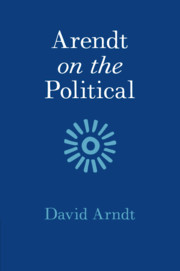Book contents
- Arendt on the Political
- Arendt on the Political
- Copyright page
- Contents
- Preface
- Acknowledgments
- Abbreviations
- Introduction
- Chapter 1 On Arendt
- Chapter 2 A Way of Thought
- Chapter 3 A Pure Concept of the Political
- Chapter 4 Thinking before Theory
- Chapter 5 Classical Political Philosophy
- Chapter 6 Rethinking the Classical Legacy
- Chapter 7 On Politics and Revolution
- Conclusion: The Political Today
- Works Cited
- Index
Chapter 3 - A Pure Concept of the Political
Published online by Cambridge University Press: 15 October 2019
- Arendt on the Political
- Arendt on the Political
- Copyright page
- Contents
- Preface
- Acknowledgments
- Abbreviations
- Introduction
- Chapter 1 On Arendt
- Chapter 2 A Way of Thought
- Chapter 3 A Pure Concept of the Political
- Chapter 4 Thinking before Theory
- Chapter 5 Classical Political Philosophy
- Chapter 6 Rethinking the Classical Legacy
- Chapter 7 On Politics and Revolution
- Conclusion: The Political Today
- Works Cited
- Index
Summary
The third chapter follows Arendt’s approach to the question of the political. She argued that theories of politics have been led astray by several prejudices: that politics is a universal part of human life; that politics is a means to nonpolitical ends; that rule is essential to politics; and that politics is ultimately a struggle for power. In her view, these prejudices distort our view of politics by abstracting the word from the history of the classical polis, which was the origin of the word “politics” and the prime example of a political community. Arendt worked out her concept of the political by retrieving and conceptualizing the nontheoretical understanding of politics implicit in classical literature and history. She argued that the polis excluded relations of rule between citizens; citizens ruled over those excluded from politics (women, children, slaves, foreigners), but that full citizens themselves were not divided into rulers and ruled. Politics, in her view, is a way of being together, based on principles of equality and nonviolence, in which people decide what to do and how to live together through open debate and common deliberation on matters of public concern.
- Type
- Chapter
- Information
- Arendt on the Political , pp. 47 - 83Publisher: Cambridge University PressPrint publication year: 2019



